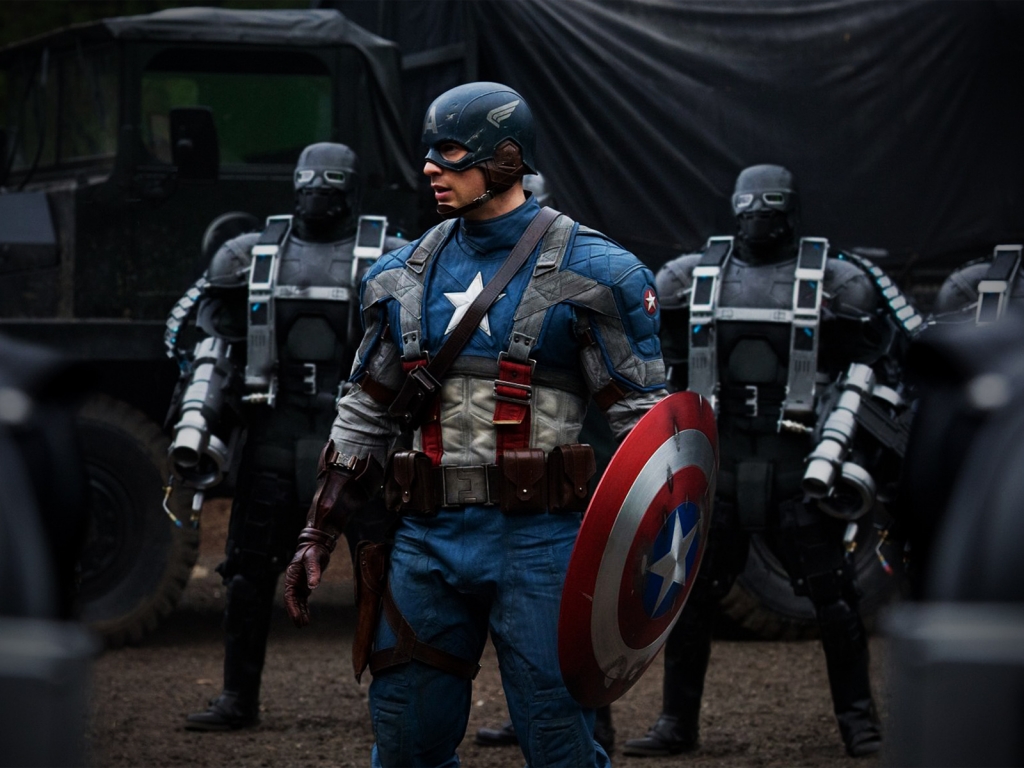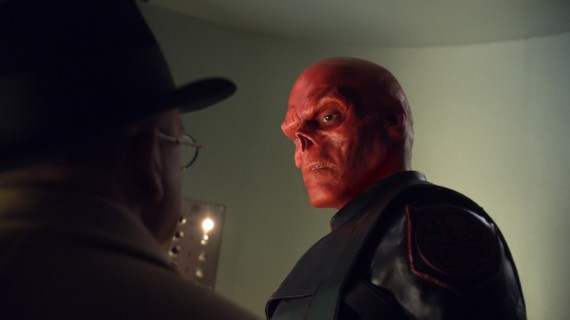Captain America: The First Avenger (2011)
DIRECTOR: Joe Johnston
CAST:
Chris Evans, Hayley Atwell, Tommy Lee Jones, Hugo Weaving, Stanley Tucci, Toby Jones, Dominic Cooper, Sebastian Stan, Neal McDonough, Derek Luke
REVIEW:
Captain America is an adequate, serviceable comic book superhero origin movie that doesn’t merit any scorn but also doesn’t generate overwhelming enthusiasm. Tying in with Iron Man, Iron Man 2, and Thor, it’s the last of the Marvel comics movies introducing each of the individual Avengers who will be united onscreen in 2012’s The Avengers, and it’s debatable whether the Cap’n would have seen the screen otherwise. Despite his long-running existence in the comics (since 1941), Captain America is no longer considered among the top tier of comic book superheroes. Part of the problem is probably also that audiences and reviewers are suffering comic book superhero fatigue; with so many superhero origin stories hitting the screens, it’s hard to make them all stand out, and the fact that they all inevitably follow the same basic formula makes it start to seem generic after so many times. I enjoyed the film, but was mildly underwhelmed. The self-consciously titled The First Avenger isn’t a terrible movie, but it lacks the certain spark that set Iron Man above the pack.
 Captain America at least has one distinction in its 1940s WWII setting. Steve Rogers (Chris Evans) is a 90-pound asthmatic who has applied and been rejected for the army five times. His tenacity gets him noticed by Dr. Abraham Erskine (Stanley Tucci), a German scientist who like Einstein has defected to the Allies and is running a secret project to create a new generation of super soldier. Erskine’s help lands Rogers in a camp under Colonel Phillips (Tommy Lee Jones, fun as usual) and British Agent Peggy Carter (Hayley Atwell), where he undergoes an experimental procedure. When he emerges, he is tall, buff, superhumanly strong and fast, and ready for action. But Steve finds himself used only for propaganda selling war bonds to the tunes of cheesy theme songs, until he defies orders to go on a rescue mission after his captured friend Bucky Barnes (Sebastian Stan). From there, he gets entangled with a plot involving HYDRA, a secret branch of Nazi special forces led by Johann Schmidt (Hugo Weaving). Officially, HYDRA takes its orders from Hitler, but Schmidt is a megalomaniac with dreams of replacing the Führer and ruling the world. He is also obsessed with finding artifacts he believes will give him the power of the gods, and has devised a superweapon he intends to unleash on the capital cities of the world.
Captain America at least has one distinction in its 1940s WWII setting. Steve Rogers (Chris Evans) is a 90-pound asthmatic who has applied and been rejected for the army five times. His tenacity gets him noticed by Dr. Abraham Erskine (Stanley Tucci), a German scientist who like Einstein has defected to the Allies and is running a secret project to create a new generation of super soldier. Erskine’s help lands Rogers in a camp under Colonel Phillips (Tommy Lee Jones, fun as usual) and British Agent Peggy Carter (Hayley Atwell), where he undergoes an experimental procedure. When he emerges, he is tall, buff, superhumanly strong and fast, and ready for action. But Steve finds himself used only for propaganda selling war bonds to the tunes of cheesy theme songs, until he defies orders to go on a rescue mission after his captured friend Bucky Barnes (Sebastian Stan). From there, he gets entangled with a plot involving HYDRA, a secret branch of Nazi special forces led by Johann Schmidt (Hugo Weaving). Officially, HYDRA takes its orders from Hitler, but Schmidt is a megalomaniac with dreams of replacing the Führer and ruling the world. He is also obsessed with finding artifacts he believes will give him the power of the gods, and has devised a superweapon he intends to unleash on the capital cities of the world.
There’s nothing surprising about Captain America, and that’s part of the lack of excitement. It follows the basic formula of the comic book superhero origin story to the letter. There’s the underdog protagonist, the obligatory love interest, the megalomaniac villain with an over-the-top scheme, a few action sequences, and a climactic one-on-one confrontation, all handled by Joe Johnston with competence but not a lot of flair. Despite attempts to make her a tough go-getter, the ‘love story’ subplot between Steve and Peggy never feels more than perfunctory. Equally underwhelming is the final showdown between Captain America and Schmidt/Red Skull, and the bad guy’s fate is left disappointingly ambiguous. While the tone never gets overtly jokey, it stays fairly lightweight for the most part, hearkening back to the kind of cornball gee-whiz derring-do of Joe Johnston’s The Rocketeer. Our bad guy, Schmidt, doesn’t get a lot of screentime or development, and being a stereotypical mustache-twirling Nazi obsessed with unearthing ancient magical artifacts makes him come across like an Indiana Jones villain. A loss on the good guy team lacks effect because the character in question and their relationship with the hero is insufficiently developed. Like both Iron Mans and Thor, Captain America includes an epilogue serving to set up The Avengers and again featuring a cameo by Samuel L. Jackson’s Nick Fury. Unlike the above three, however, Captain America feels less like it can stand on its own and more like a two-hour preview serving less the purpose of a memorable motion picture then providing the last- or first- Avenger with a backstory. In fact, it spends so much time on the central character’s origin story that the rest of the plot feels underdeveloped and there’s not enough time left to establish a compelling story. It’s perhaps not coincidence that the early set-up scenes before Steve becomes Captain America are more engaging than a lot of what comes after.
 The CGI work is exceptional, seamlessly transforming hunky Chris Evans into a five-foot tall, ninety-pound shadow of himself. It’s tricky to pull off effects like this without it looking goofy, but the CGI here is undetectable, and ‘Little Steve’ never looks anything less than a real person. No CGI is used when he hits the opposite extreme; Evans’ impressively buffed-up physique is the real deal. Also effective is the makeup transforming Hugo Weaving into the hideously disfigured Red Skull, an example of a character at least physically looking like they have stepped straight off the comic panel into the film. Of the several generic action sequences (which include a raid on a HYDRA base, a train ambush, and the final confrontation), the best is the first, pitting the newly upgraded Steve against a HYDRA spy (Richard Armitage). The movie has some fun with the 1940s propaganda cheesiness of the Captain America theme song and dancing chorus girls; less intentional cheesiness occasionally seeps into the action sequences with their overuse of slow motion shots of Captain America sending foes flying (then again, it’s hard for a movie called Captain America not to have at least a mild cheese factor). There are moments when Adam West-style “BAM!” and “KAPOW!” signs wouldn’t be too out of place. There are also elements sprinkled around besides the Nick Fury epilogue that serve as tie-ins to the other Avenger prequels, most prominently the inclusion of Howard Stark (Dominic Cooper), a young Howard Hughes-esque engineer and entrepreneur who supports Dr. Erskine’s project and, as comic fans can tell you, will go on to father Tony Stark/Iron Man (an older Howard made a cameo in Iron Man 2, played by John Slattery).
The CGI work is exceptional, seamlessly transforming hunky Chris Evans into a five-foot tall, ninety-pound shadow of himself. It’s tricky to pull off effects like this without it looking goofy, but the CGI here is undetectable, and ‘Little Steve’ never looks anything less than a real person. No CGI is used when he hits the opposite extreme; Evans’ impressively buffed-up physique is the real deal. Also effective is the makeup transforming Hugo Weaving into the hideously disfigured Red Skull, an example of a character at least physically looking like they have stepped straight off the comic panel into the film. Of the several generic action sequences (which include a raid on a HYDRA base, a train ambush, and the final confrontation), the best is the first, pitting the newly upgraded Steve against a HYDRA spy (Richard Armitage). The movie has some fun with the 1940s propaganda cheesiness of the Captain America theme song and dancing chorus girls; less intentional cheesiness occasionally seeps into the action sequences with their overuse of slow motion shots of Captain America sending foes flying (then again, it’s hard for a movie called Captain America not to have at least a mild cheese factor). There are moments when Adam West-style “BAM!” and “KAPOW!” signs wouldn’t be too out of place. There are also elements sprinkled around besides the Nick Fury epilogue that serve as tie-ins to the other Avenger prequels, most prominently the inclusion of Howard Stark (Dominic Cooper), a young Howard Hughes-esque engineer and entrepreneur who supports Dr. Erskine’s project and, as comic fans can tell you, will go on to father Tony Stark/Iron Man (an older Howard made a cameo in Iron Man 2, played by John Slattery).
There aren’t really any bad performances, but there also isn’t likely to be much writing done about the acting. Chris Evans, no stranger to playing comic book superheroes after The Human Torch in the Fantastic Four films, at least shows enough range to go from cocky womanizer Human Torch to strait-laced Steve Rogers, who gets a lot better at beating up bad guys after donning Captain America’s muscles but doesn’t get any less tongue-tied around women. A character who’s this much of a “do-gooder” could either be cheesy or ring false in the wrong hands, but Evans imbues Steve with enough sense of sincerity and earnestness for us to believe in him (on second thought, maybe that’s not as easy an accomplishment as it sounds). Tommy Lee Jones is what we expect, entertainingly barking out crusty one-liners. Hayley Atwell gives a dash of toughness to the obligatory love interest. Hugo Weaving’s Red Skull is a generic and underdeveloped dastardly megalomaniac, with only his grotesque appearance lending him any distinction. Toby Jones plays his scientist sidekick Dr. Zola, a role that in another era seems like it would have been played by Peter Lorre. Supporting performers like Dominic Cooper (as the Howard Hughes-esque Howard Stark) and Sebastian Stan (as Bucky Barnes, Steve’s best friend and later Captain America’s right hand man) provide adequate support, but their screentime is limited. Still smaller roles include Neal McDonough and Derek Luke as two of Cap’s compatriots, Richard Armitage as a HYDRA assassin, and the closing cameo by Samuel L. Jackson that’s become obligatory in these movies. The best performance in the supporting cast comes from an almost unrecognizable Stanley Tucci, who gives a nice character actorly turn as the Einstein-esque Dr. Erskine, but he’s not around for long.
Comic fans will probably enjoy Captain America; it’s competently-made, does an efficient job of laying out the superhero’s origins in an easy-to-follow manner, it has a breezy pace and a few action sequences. It fulfills the basics of what it sets out to do. Point A to Point B is reached clearly and efficiently. Like Steve Rogers, the movie answers the call of duty, but unlike him, it doesn’t go above and beyond.
**1/2